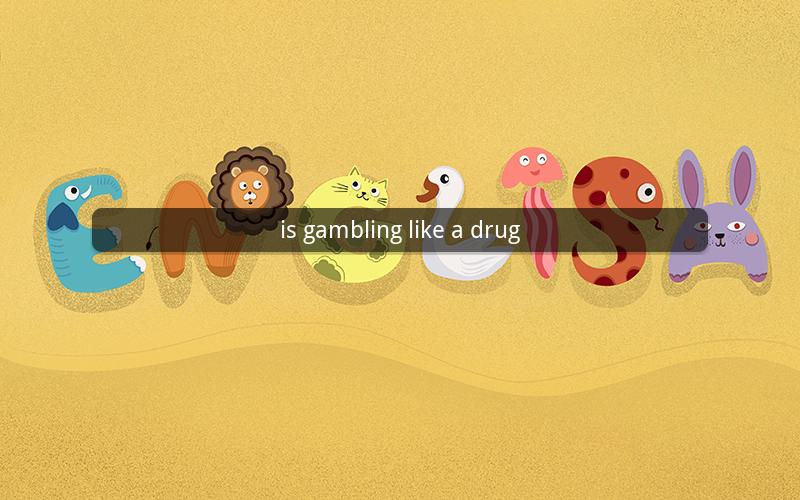
Table of Contents
1. Introduction
2. Understanding Gambling as an Activity
3. The Psychological Aspect of Gambling
4. Similarities with Drug Use
5. The Impact of Gambling on the Brain
6. The Role of Dopamine in Gambling
7. The Social and Economic Consequences of Gambling
8. Treatment and Prevention
9. Conclusion
10. Frequently Asked Questions
1. Introduction
Gambling has been a part of human culture for centuries. It has evolved from a simple game of chance to a multi-billion-dollar industry. However, the question of whether gambling is similar to drug use has been a topic of debate among researchers and policymakers. This article explores the similarities between gambling and drug use, the impact on the brain, and the social and economic consequences of gambling addiction.
2. Understanding Gambling as an Activity
Gambling is an activity that involves risking something of value, such as money, for the chance of winning something of greater value. It can take various forms, including lottery, sports betting, poker, and slot machines. While many people engage in gambling as a form of entertainment, others may develop an addiction that can have severe consequences.
3. The Psychological Aspect of Gambling
Gambling addiction is often characterized by a psychological dependence on the activity. Individuals who are addicted to gambling may experience intense cravings, anxiety, and depression when they are not engaging in the activity. They may also experience a sense of euphoria and relaxation when they are gambling, which can lead to increased engagement in the activity.
4. Similarities with Drug Use
Gambling addiction shares several similarities with drug use. Both activities can trigger the release of dopamine in the brain, which is responsible for feelings of pleasure and reward. This can lead to a cycle of repeated engagement in the activity, despite the negative consequences. Additionally, both activities can lead to a loss of control, social isolation, and financial problems.
5. The Impact of Gambling on the Brain
Gambling can have a significant impact on the brain, similar to drug use. The repeated engagement in gambling can lead to changes in the brain's reward system, making it more difficult for individuals to experience pleasure from other activities. This can lead to a reliance on gambling as a means of obtaining pleasure, which can be harmful to their overall well-being.
6. The Role of Dopamine in Gambling
Dopamine is a neurotransmitter that plays a crucial role in the brain's reward system. When individuals engage in gambling, the release of dopamine can create a sense of euphoria and excitement. This can lead to increased engagement in the activity, as individuals seek to recreate the same feelings of pleasure. Over time, this can lead to a dependence on gambling as a means of obtaining pleasure.
7. The Social and Economic Consequences of Gambling
Gambling addiction can have significant social and economic consequences. Individuals who are addicted to gambling may experience financial problems, such as debt and bankruptcy. They may also experience social isolation, as they may prioritize gambling over their relationships and responsibilities. Additionally, gambling addiction can lead to mental health issues, such as depression and anxiety.
8. Treatment and Prevention
Treatment for gambling addiction can involve various approaches, including therapy, support groups, and medication. Prevention strategies can include education about the risks of gambling, promoting responsible gambling practices, and implementing regulations to limit access to gambling activities.
9. Conclusion
Gambling addiction shares several similarities with drug use, including the release of dopamine in the brain and the potential for social and economic consequences. Understanding the psychological and neurological aspects of gambling addiction can help individuals and policymakers address the issue more effectively.
10. Frequently Asked Questions
Q1: What is the main difference between gambling and drug use?
A1: The main difference between gambling and drug use is that gambling involves risking something of value for the chance of winning something of greater value, while drug use involves ingesting substances that alter the brain's chemistry.
Q2: Can gambling lead to addiction?
A2: Yes, gambling can lead to addiction, as it can trigger the release of dopamine in the brain, leading to a cycle of repeated engagement in the activity.
Q3: How can I recognize gambling addiction?
A3: Signs of gambling addiction include a preoccupation with gambling, loss of control over gambling behavior, financial problems, and neglect of personal and professional responsibilities.
Q4: What are the risks of gambling addiction?
A4: The risks of gambling addiction include financial problems, social isolation, mental health issues, and an increased risk of developing other addictions.
Q5: How can I overcome gambling addiction?
A5: Overcoming gambling addiction can involve seeking professional help, joining support groups, and developing healthy coping mechanisms.
Q6: Are there any medications available to treat gambling addiction?
A6: There are no specific medications available to treat gambling addiction. However, some medications may be prescribed to manage co-occurring mental health issues.
Q7: Can gambling addiction be prevented?
A7: Yes, gambling addiction can be prevented through education, responsible gambling practices, and regulations that limit access to gambling activities.
Q8: How can I help someone with a gambling addiction?
A8: You can help someone with a gambling addiction by offering support, encouraging them to seek professional help, and being patient and understanding.
Q9: Is it possible to recover from gambling addiction?
A9: Yes, it is possible to recover from gambling addiction with the right support, treatment, and commitment to change.
Q10: How can I find support for gambling addiction?
A10: You can find support for gambling addiction through therapy, support groups, and organizations that specialize in addiction treatment.